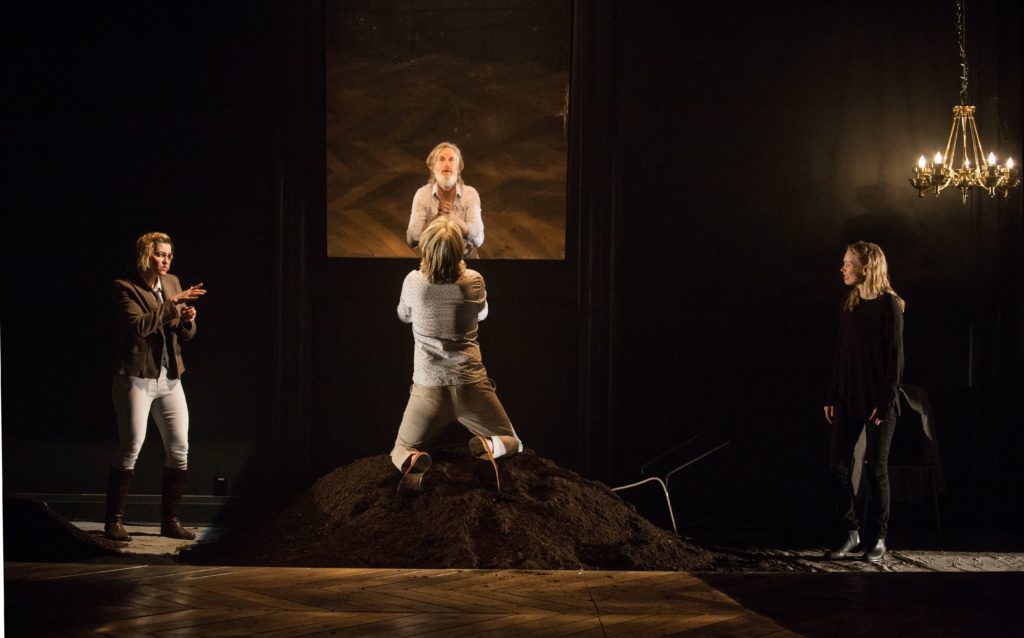Hamlet: brilliant performances but opposite gender casting adds nothing new to the play

Photo Bronwen Sharp That Why Not Theatre’s Prince Hamlet is daring and different is undeniable. Adapter and director Ravi Jain has taken the well-known classic and given it a gender-bending, modern, bilingual twist. By approaching the story from a different perspective, the aim is for more people to see themselves in the mirror being held up to nature, in the director and playwright’s words. It is an ambitious undertaking and, while the approach is refreshing and there are some stand-out moments, there are so many elements competing for attention that the production comes off as messy rather than avant-garde.
Jain has gone through the original Hamlet and edited the script without touching the language – he cuts some parts and rearranges others, an act that results in a faster-paced, tighter performance that pleasantly feels almost like watching a movie unfold in real time. Some of his directing, such as the fight scenes, is truly brilliant and brings something fresh to the play, making the audience think and help construct the scenes along with the cast.
All of the characters, other than King Claudius and Queen Gertrude, are cast as the opposite gender. It’s an interesting idea that ultimately falls flat because it doesn’t add anything to the play or characters, other than allowing male and female presenting actors to play the opposite sex. The viewers understanding of Hamlet isn’t challenged by the fact that he is played by a woman, nor do Ophelia or Laertes read any different because they are played by the opposite gender.
Prince Hamlet is also a bilingual production, presented in English and American Sign Language (ASL). Indeed, in the re-jigged version, the whole play is told from the perspective of Horatio, Hamlet’s friend, performed by Dawn Jani Birley in ASL. It’s a great effort at inclusivity and was done very well for the most part. Birley is easily one of the standouts. Her Horatio is wonderfully expressive and emotional. The scenes that only used ASL could only work if they include a brilliant actor who can “translate” with their facial and bodily expressions. Birley is absolutely that actor and shines in her incredibly demanding role.
The rest of the acting was passionate, though uneven, with the perfect example being Christine Horne. She brings an ambiguity, as well as a lightness and mockery to Hamlet’s madness that is refreshingly different and about as far from Laurence Oliver as you could get. Unfortunately she is pretty flat otherwise, a stylistic choice that ends up burying some of the most important soliloquies in the quick, monotone delivery. Jeff Ho is also a standout as Ophelia, in a performance that is delicate and nuanced. He is a pleasure to watch, even as the audience’s heart slowly breaks with and for the gentle, vulnerable soul presented on stage. Barbara Gordon’s impeccable comedic timing as Polonius was a great respite from the drama and serious self-reflection present throughout the play.
The production’s star without a doubt is its set and lighting. Lorenzo Savoini’s set is visually striking, made all the more so by its sharp simplicity. A wooden platform is surrounded by piles of dirt and dominated by three large mirrors in the back, which extend the stage and perfectly underscore the meaning of the production. André du Toit’s lighting and Thomas Ryder Payne’s sound design gives the play a sometimes eerie, sometimes fast paced and exciting atmosphere that propels the story and its meaning along.
Why Not Theatre’s idea to present Hamlet in a new, inclusive, and unconventional light is a great one. A lot of thought clearly went into the production, but all the different elements end up overwhelming the story, making the individual parts the main focus. Having said that, Prince Hamlet has a lot of potential and it’s good to see diversity brought to the classics.
Prince Hamlet, produced by Why Not Theatre
Adapted from William Shakespeare and directed by: Ravi Jain
Christine Horne: Hamlet
Dawn Jani Birley: Horatio/ASL and visual translation
Barbara Gordon: Polonius
Jeff Ho: Ophelia
Rick Roberts: Claudius
Karen Robinson: Gertrude
Khadijah Roberts-Abdullah: Laertes
Hannah Miller: Guildenstern/Player Queen/Gravedigger/Guard/Osric
Miriam Fernandes: Rosencranz/Plater King/Gravedigger/Guard
Lorenzo Savoini: Set and costume designer
André du Toit: Lighting designer
Thomas Ryder Payne: Sound designer
Neha Ross: Stage manager
Tamara Protic: Assistant stage manager
Andrew Pye: Production manager
Kevin Matthew Wong: Producer/company manager